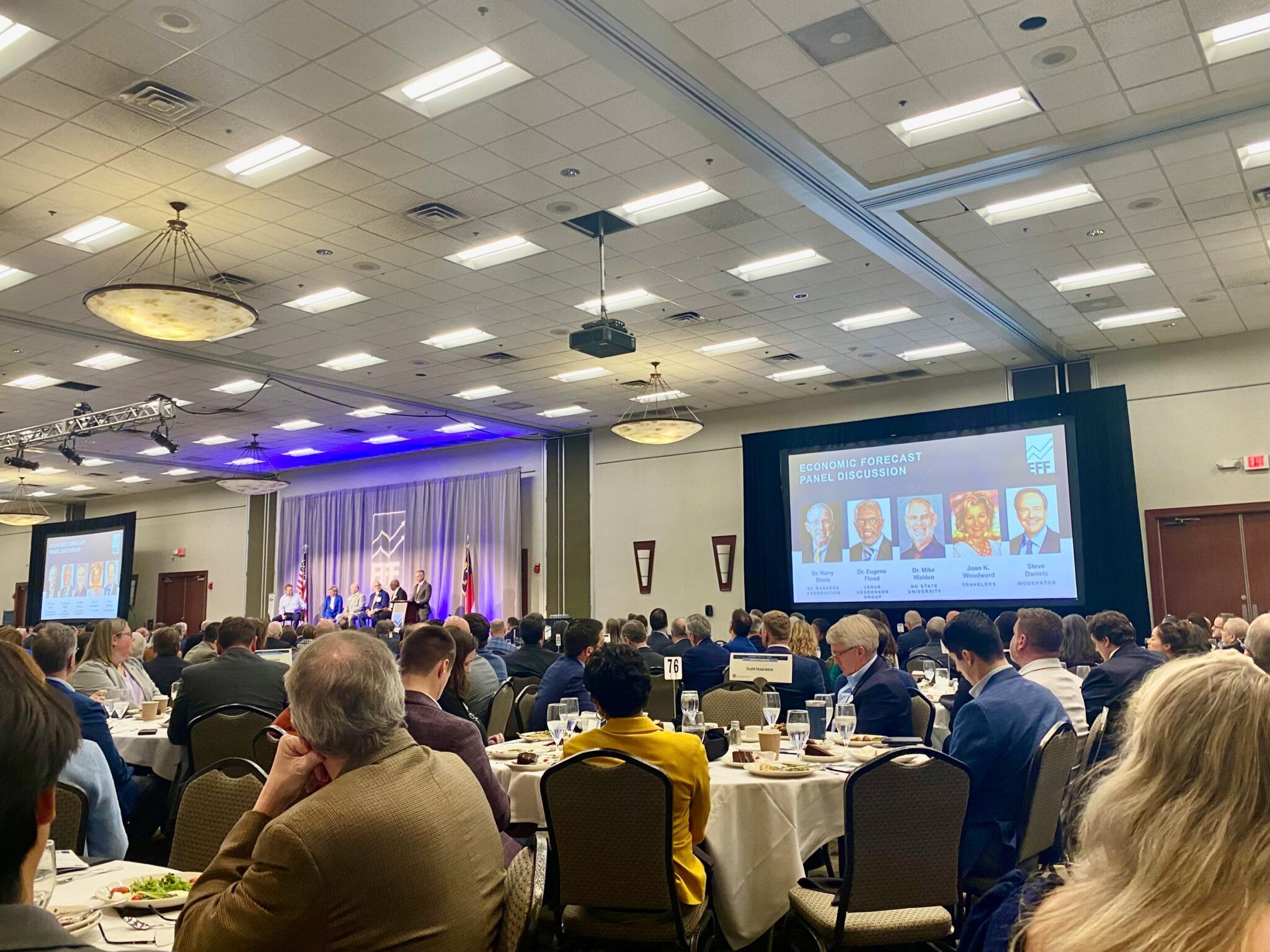Over 900 registrants attended last week’s 22nd Annual Economic Forecast Forum hosted by NC Bankers and the NC Chamber. It was an information packed day focused on job retention, job creation and overall quality of life in North Carolina. The two discussion panels presenting:
- How North Carolina can become, for a third year in a row, the #1 State for Business. Panelists included:
- Christopher Chung, CEO of the Economic Development Partnership of North Carolina
- Gary Salamido, President and CEO of the NC Chamber
- Sean Suggs, President of Toyota Battery Manufacturing (NC), Toyota
- The 2024 economic forecast for North Carolina. Panelists included:
- Harry Davis, Economist at the NC Bankers Association
- Eugen Flood, Director of the Janus Henderson Group
- Mike Walden, a William Neal Reynolds Distinguished Professor at NC State University
- Joan Woodward, Executive VP of Policy at Travelers
KEY TAKEAWAYS
- Factors that have contributed to NC’s popularity for businesses:
- Great talent
- Strong labor force and work ethic
- Good schools
- Low taxes
- Significant investment in the transportation infrastructure
- Moderate climate and beautiful landscapes
- Seen as a great place to live and work
- How has NC’s ranking as the #1 State for Business (in 2022 and 2023) helped the state?
- The award brings more looks and attention to the state
- It shows NC’s successful efforts
- It puts NC on a short list for businesses who are considering another location
- Makes it easier for NC to win deals since it is easier to sell a state with the award
- Toyota’s $14 billion investment in North Carolina
- The battery manufacturing plant deal in Liberty closed in 2021. Thru collaboration with the mayor of Liberty and the Governor of NC, it represents a $14 billion investment in our state, including the creation of up to 5,000 jobs. (The largest investment in a single site in Toyota’s history.)
- The workforce was a key factor in Toyota’s decision. So far 600 have currently been hired, and Toyota expects to double that number of hires over the next couple of years.
- Hurdles Toyota face surround affordable childcare and housing.
- Toyota seeks to retain their talent, where employees see their employment as a career for life.
- The FAME program, initially created by Toyota and transferred to the Manufacturing Institute in 2019 for national scaling, is a community college/work hybrid that provides technical training and professional practices with intentional hands-on training.
- Toyota wants their employees to take advantage of NC colleges/universities, as well as have a great job and good wage.
Affordable Housing
- NC’s battle for talent focuses on removing any roadblocks potential employers/employees might have, such as affordable housing, an employee’s commute to/from their home and job and affordable childcare.
- With the housing market, affordable housing has been difficult due to higher interest rates and the large number of newcomers to NC.
- People are remaining in the house they have because they cannot afford a new one.
- Despite the volume of new construction, more people are moving here than houses being built.
- When interest rates drop, housing will remain a challenge due to more people being able to afford homes, which in turn, will drive prices up.
- NC’s biggest challenge is spreading out its population growth. To date, metros have seen the largest increase. One solution is in bringing better paying jobs closer to rural areas.
In closing….
- The expert consensus is that there will be slower economic growth in NC, but we will not see a recession. NC is well-positioned for any issues in the economy.
- First half of 2024 will see unemployment and job growth down. The 2nd half of 2024 will have lower interest rates, with a prediction of 2% or close to it. (Interest rates have not increased since July 2023.)
- If NC has a recession in 2024, it will not be seen until 2025.
- A possible recession could be seen due to:
- Government stimulus going away
- Supple chain distribution, caused by the CHIPS Act, which aims to bring semiconductor supply chains home, support innovation and protect national security.
- Labor shortages, due to:
- Immigration problems, due to reforms
- COVID – people quit their jobs and didn’t go back. It was noted more women returned to work then men after the pandemic.
- One economist believed AI to be the biggest US threat, due to it taking jobs (a surprising example given was architects). To counteract the threat, people need to be trained for much needed trades, such as plumbers and contractors. Too many people have degrees that they are unable to use.

